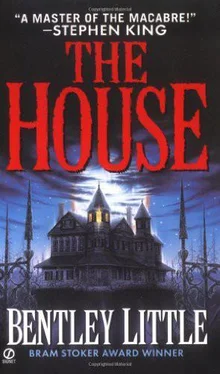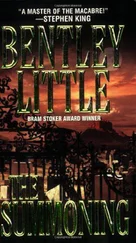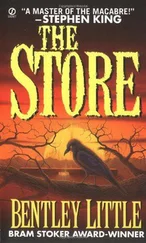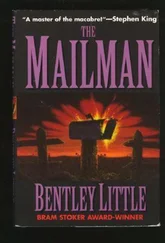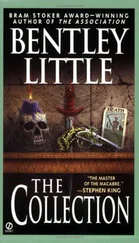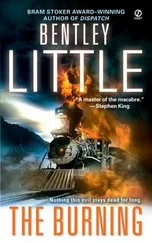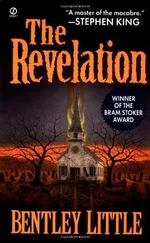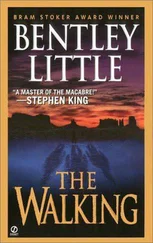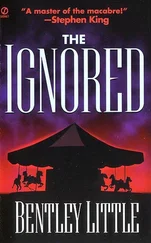Maybe he should call it off, wait it out, see what transpired.
There was no real reason for him to go back to Oakdale, to the house.
Yes there was.
He didn't know what that reason could be, but it was there, and Norton could not let his own cowardice prevent him from doing what he knew was right, what he knew had to be done. He'd spent his entire professional life lecturing students about history, going over the past and second-guessing, making moral judgments about decisions that were made, and telling both his students and himself that they should have been made differently.
Well, now was his opportunity to put his money where his mouth was. He had a decision to make here, and he knew what needed to be done. Did he have the guts to do it?
Yes.
But he could not drag Hal into this. As grateful as he was for his friend's advice and support, for his willingness to share the burdens to be borne, he knew deep down that the responsibility was his own. This was something he had to do himself. He could not risk endangering Hal.
He walked into the bedroom, threw the blanket and the toast atop it to the floor, and got his suitcase out of the closet, throwing it onto the mattress. He began packing underwear and socks, shirts and pants.
No, he decided. He would not pick up Hal. He would leave his friend behind.
He would go back to the house alone.
* * *
There were signs along the way.
It was remarkable how quickly and completely his thinking, his mind set, his outlook had changed. He who had always been so literal and logical and concrete, who had never entertained the possibility that anything outside the material world existed, was now reading import into roadside occurrences, seeing omens in passing phenomena glimpsed through the windshield of his car. It was egocentric, this thinking, this belief that supernatural forces were creating portents out of landscapes and natural objects just for his sake.
But he knew that's what was happening.
Over the town of Magruder , he saw a black rainbow.
No clouds, no rain, only the black-banded arch, stretching across the clear blue sky.
It began in a pasture this side of the town.
Its end appeared to be somewhere in the vicinity of Oakdale.
There were other signs as well. In Shaw: bodies of dead squirrels piled into a pyramid on the empty front island of an abandoned gas station. In Edison: a sycamore that had been carved into the shape of a girl bearing an eerie resemblance to a thin and stretched-out Donna. In Haytown : a bearded wild-haired hitchhiker by the side of the road, holding a homemade sign that read: "Return."
He almost chickened out. Driving into Oakdale from the east side of town, he could see the weather vane on the roof of the house's central gable, visible even above the bank building. He passed through the downtown, grown from two blocks to five in the intervening years and now populated with fast-food restaurants and gas stations, and emerged into open farmland. Ahead, off the road, was the house, its dark bulk contrasting sharply with the low white buildings of the other farms.
The black rainbow ended at the foot of the drive.
It disappeared almost instantly, and his first instinct was to make a U-turn and head back to Finley.
But then he thought of Carole's ghost and the trail of toast and the dirty girl in the empty house and he knew he had to go forward.
Return.
He drove down the road, up the drive, to the house.
There was a plucked chicken waiting for him.
It was on a stick in the center of the drive, speared through the buttocks, and though there was no sign or message taped to it, he knew that it had been meant as a greeting. The animal looked freshly killed, had obviously not been sitting out too long in the Midwest sun, and the orange beak in its naked face made it look as though it were smiling.
One featherless wing pointed toward the house.
His gaze followed the pointing wing, and as he scanned the length of the front porch and the various darkened windows, he realized that he was holding his breath.
He was expecting to see Donna.
Donna.
It returned to him all of a sudden in vivid detail, what had happened to his family, and Norton sat there, staring at the chicken, trembling.
Donna.
He could see her face clearly in his mind, her over bright eyes and sly smile and tanned dirty skin. He could not remember when he'd first met the girl, but it seemed as though she'd always been around. They'd played together as children. The house had no close neighbors, and both his brother and two sisters were considerably older than he was, so he really had no other playmates until he began going to school. Even then, Donna remained his best friend.
They'd done typical children's things at first--built forts and dug tunnels and played imaginary games--but, gradually, things changed. Even now, Norton did not know how it had happened or why he'd gone along with it. He knew what he was doing was wrong even at the time, and he felt guilty and ashamed. He was smart enough to keep it from his family, smart enough not to tell his parents or his brother or his sisters, but he was not smart enough to avoid doing it, not smart enough to keep from getting involved.
It started with a group of ants. Donna had found an anthill out in back of the house, in the area between the house and the silo. She showed it to him, then stepped on it, and they both laughed as they watched the ants scurry around. Then she told him to wait and ran off into the house. She returned a few moments later with a kerosene lamp and a match. He knew what she wanted to do, and he didn't like the idea--he knew they'd get in trouble for it--but she smiled at him and told him to gather some dry weeds and twigs, and he did. He tossed the sticks and weeds on top of the flattened anthill, and Donna dribbled some of the kerosene on top of it, set down the lamp, and lit the match.
It was like a little explosion. The twigs and weeds went up instantly, and all of the ants stopped dead in their tracks and shriveled into tiny black balls. Donna crouched down next to the fire and watched, laughing and pointing, and while he knew it was wrong, he also thought it looked kind of neat, and he helped her pick up some of the stray ants that had escaped, the ones outside the fire range, and drop them into the flames.
They crackled and popped as they burned, and the two of them spread out, looking for other bugs. Donna found a beetle and threw it in. He kicked a grasshopper across the dirt and into the fire. They tossed in a whole bunch of spiders and crickets. Donna found a kitten and was about to drop it onto the blaze, but by that time the flames had died down to almost nothing, and the animal got away.
He was glad.
It went on from there, though, and it got worse over the next year or so. They buried a hamster alive. They skinned a dog. He remembered holding a neighbor girl down while Donna . . . assaulted her with a stick.
She loved it, all the violence, all the torture, all the death. It excited her. As kids today would say, she "got off" on it.
Then she started demanding sex.
They did it and he loved it, but even there things changed, got rougher, and the type of sex she wanted became more unusual, more exotic.
Unnatural.
He was tempted to try what she wanted, of course.
But he was more frightened than anything else. She scared him, and that was what finally brought him back to his senses and made him realize that what they were doing was wrong. They'd never been caught, never gotten in trouble for anything they'd done, no one had ever told. But he knew it wasn't right, and he latched on to this as a way to put a stop to it all, to end the whole thing and just ... backtrack.
So he broke it off. He stopped seeing her. She'd want to play and he'd be busy; she'd try to sneak into his room and he'd make sure his doors and windows were locked. Eventually, she just . . . went away. He was not sure how, exactly. There was no final fight, no big to do, they simply stopped seeing each other, and then one day he noticed he didn't have to make an effort to avoid her anymore. She was gone.
Читать дальше
